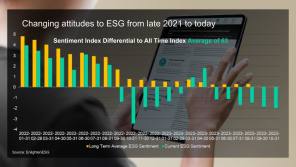
Advisers beware: Green boom might go bust without tech infrastructure

But the high-profile launch and quick withdrawal of the Liontrust ESG trust – which this month returned money to initial investors less than a week after launch due to soft investor interest – showed that green investment is not a guaranteed success.
We may look back at this time as a watershed moment in the adoption lifecycle of ESG investing and sustainable financing. We are moving from an age of growing awareness, to higher demand and inflows, to a place where ESG investment products are now coming under greater scrutiny by regulators and investors seeking clarity and transparency.
Multi-factored drivers
What is driving this transition is certainly multi-factored. Increasing numbers of headlines are debating so-called corporate ‘greenwashing’, where businesses make unsubstantiated claims about their ESG credentials and meeting their sustainability goals, or, in the case of funds advertised as impact investments, contain companies at odds with their stated sustainability aims.
Confusing and overlapping standards from multiple well-meaning regulatory and advisory bodies are creating even more confusion. Numerous working groups and panels are trying to sort out the problem, but the current environment for end investors is still unclear. As options proliferate, there is growing debate about whether over-performance once seen for ESG funds will remain or shrink.
Will momentum be sustained?
What happens in the current inflection point will determine whether the momentum can be sustained, and the necessary capital can be provided for the in-progress green revolution to combat climate change.
Wealth managers will certainly influence whether this is a temporary wobble or the start of a more serious reassessment of sustainable investment. Their role now is to translate the initial enthusiasm into a reliable, consistent product set that delivers on the increasingly complicated and individual needs of investors. This will require considerable commitment from the top of organisations, including the chief executive.
ESG not at forefront of tech spend
Unfortunately the current data is suggesting that the majority of wealth and asset managers are not putting ESG to the fore of their priority technology spends in the near term.
The recent FIS Readiness Survey asked 400 asset and wealth managers about their planned investment priorities over the next 12 months. Less than half (43 per cent) of UK businesses are prioritising ESG-focused products and services to drive growth in the next 12 months – a rate below client technology and several other areas.
Why is this de-prioritisation a concern? Investors will need increasingly more granular ways to understand and analyse their investment performance and risk exposure according to ESG metrics, considering materiality factors and aligning with industry standard frameworks. All of this aggregated data needs to be available on a frequently updated basis, at a portfolio, sub-portfolio and individual fund level. Investors need to cross-reference and work through multiple simultaneous criteria, along with having investment options as their preferences change.
Reporting regime gaining momentum
In the meantime, the journey towards a defined regulatory framework and mandatory reporting is gaining momentum. Major regulatory bodies are already deep in consultations all over the world on the best ways to price standards and metrics around green wealth and asset management.
These capabilities are far beyond a simple pledge of promise to invest ‘green’. They cannot be implemented overnight or without significant resources. The companies that take note of this will be the ones who maintain and gain reputation as true leaders in this sector.
A time of promise
We are in a time of uncertainty but also promise. Better sustainability and governance is seen by a sizeable portion of the population as the defining issue of our time.
Advisers must demonstrate a commitment to ensuring opportunities for sustainable investing that align with their clients’ values, goals and expectations, which, of course, includes a prioritisation on the needed technology infrastructure. Those that rise to the challenge will solidify the cornerstone of trust in the advisory relationship and position themselves well for the green boom ahead.
Nasser Khodri is president of capital markets at FIS



.png)
